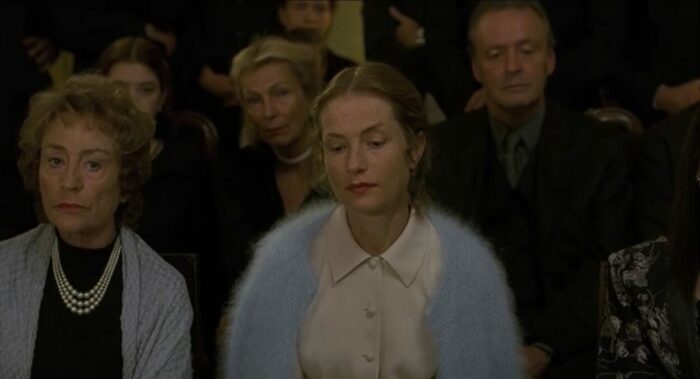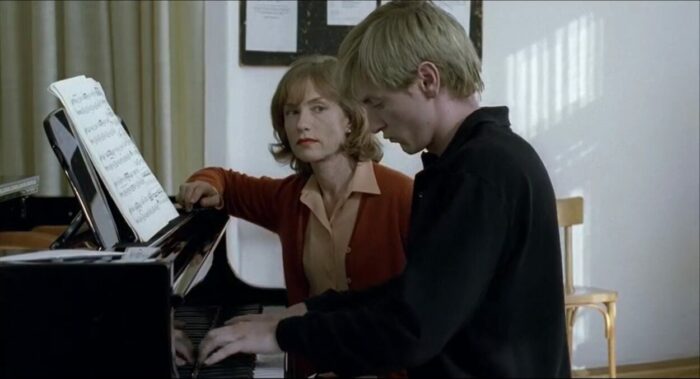The Piano Teacher, 2001 film by the Austrian director Michael Haneke, depicts the world of Western classical music, more precisely, the routine life of music teachers and students. The film is based on the novel by Elfriede Jelinek, who knows this world very well, once a piano student herself.
Classical music is a product of a reason-dominated Western culture. Therefore, I think, the issues that The Piano Teacher deals with can be generalized as the issues of Western society. Haneke and Jelinek, being Austrians, may speak about their country, but the fact that it’s a French-language film made in France already takes it beyond one specific country. The film can be seen as a deconstruction of this reason-driven world. In the context of The Piano Teacher, limitations and sacrifices that are demanded by classical music, or more by striving to perfection, go beyond the musical environment and apply to the life of individuals in general terms.
The protagonist of the film, Erika (Isabelle Huppert), is a frustrated pianist who failed to achieve greatness despite all the sacrifices she made for it and now has to teach young pianists who still pursue their hopes for greatness. Erika lives in a constant struggle to balance her reason and feelings. Her life is structured and controlled by her mother (played by Annie Girardot who brings a somewhat ironic air to the character). Mother wants to be aware of her every move, and doesn’t leave any space in Erika’s life for anyone else. It’s strange to see them sleeping in the same bedroom, like spouses. So mother even physically replaces any potential partner for Erika.

Erika obeys the rules established by her mother, her profession, or society. Though underneath her strict conduct, and plain clothes, she allows herself occasional misdemeanors. These are perhaps acts of rebellion against oppression. She visits sex shops and watches porn while ignoring male customers that stare at her perhaps surprised to see a woman there. Next time, she goes to a drive-in theater and watches a couple having sex in their car, risking getting caught. And she cuts herself. So these acts of rebellion are actually self-destructive. She drives herself to the verge of destruction. But still, seems to be in control, as she’s been getting away with it so far.
This monotonous and controlled life changes when Erika meets a young man, Walter Klemmer (played by Benoît Magimel) at a family concert. She plays Bach at the concert. Klemmer, after hearing about Erika’s opinions and tastes, plays Schubert—one of her favorite composers. Her challenging behavior clearly does not intimidate Klemmer. On the contrary, he accepts the challenge and starts pursuing her, under the guise of the love of music. He eventually succeeds to be admitted to Erika’s class at the conservatory.
So, when Klemmer appears in Erika’s life that is controlled by her mother, the strange triangle is created, where all three participants—Erika, her mother, and Klemmer—fight for domination.
I’ve mentioned Erika’s struggle between reason and feelings, but at first glance, there is no place for feelings in her life. Erika as a teacher is harsh and even cruel. She criticizes every mistake of her students and clearly likes to belittle them. Not at all surprising for the person whose every move is controlled. She loves to control and rely on reason. She even states at one point that she has no feelings, and even if she had the reason would eventually dominate over them.
I would say that Erika participates in life only through watching. Perhaps, this helps her control her feelings. Like his protagonist, Haneke also keeps his distance. This may be necessary for him to observe without being emotionally involved and therefore avoid any bias. There are always TVs and screens in his films, and The Piano Teacher is not an exception. Here, Erika’s mother is always watching TV. These screens create an air of detachment from life, experiencing life through TV. But if for Haneke this detachment is a method in his work, Erika does this with her life. In music, she can reflect on feelings and know how to express them through piano, but she still prefers to contain them within the limits of reason. She observes her feelings and this makes her case even more tragic, as she knows what’s going on.
In this regard, her words about Schumann—her other favorite composer— deserve special attention:
Have you read Adorno on Schumann’s Fantasia in C Major? He talks of his twilight. It’s not Schumann bereft of reason, but just before. A fraction before. He knows he’s losing his mind. It torments him but he clings on one last time. It’s being aware of what it means to lose oneself before being completely abandoned.
They sound like a premonition of her own fate. Haneke even places Schumann’s portrait on the wall in Erika’s class. It serves as a reminder of the above words about Schumann and as a hint of the impending shuttering of Erika’s carefully constructed existence within the confines of reason.
I keep mentioning composers not only because the film is about the piano teacher and it’s thematically relevant. Haneke uses music as a means to show Erika’s hidden world, those feeling side that she so carefully covers with a cold demeanor. Schubert reflects Erika’s inner world, with Winterreise conveying the coldness and despair. ‘It’s deep but not sentimental’, according to Erika. While Bach is the voice of reason Erika so desperately tries to cling on.
Music often goes in contrast with what we see on the screen. I would say Haneke constructs the film based on the counterpoint principle. He builds it on opposing themes and characters and contrasts between consecutive scenes. Counterpoint is the driving force in music. Haneke may be using it in his other films as well. But it’s especially relevant to this one about the piano teacher whose daily life is in contrast with her hidden, inner life and secrets, and whose strict reason-based view of art and music is opposed to her own inner turmoil and clearly unreasonable secret ventures.
Erika’s actions and feelings towards Klemmer are contrasting too. The more she is attracted to Klemmer, the more obstacles she creates for him. But on the other hand, the more obstacles Erika creates, the more attracted Klemmer seems to be. Perhaps, this is what made Erika think that she has finally found a person who is a perfect fit to play the part in her love game.
Her dressing style also reveals the contradiction between her outer and inner lives. On the one hand, she buys colorful dresses that are destined to hang forever in her wardrobe, while dresses in plain grey or beige colored clothes. Her style and color change only after the scene in the bathroom with Klemmer which is more a power play scene, than a sex scene.
Another contrast is the personalities of Erika and Klemmer. If Erika lives by reason and rules, hardly allowing herself any freedom, apart from those occasional adventures, Klemmer lives a full life: studies engineering and music and plays hockey. If Erika keeps her emotions under the thick ice of her coldness and avoids contact with people, Klemmer is very expressive and uses his communication skills very well. And finally, if Erika is romantic and emotional deep inside, Klemmer is purpose-driven and doesn’t really care much about emotions, even if he talks about them so much.

Klemmer, in fact, partially succeeds in opening Erika up. As she believes that she’s in control, starts revealing herself to Klemmer, and sets one final challenge. She writes a letter to him about the things that she wants him to do with her, with a detailed description of her sadomasochistic desires. The scene where she forces Klemmer to read the letter is probably my favorite. This is the scene where her defenses finally shutter. It’s fascinating to watch Isabelle Huppert’s transformation. Starting with Erika’s usual proud and cold, even audacious gaze, the scene ends with her mask melting away revealing beneath it a woman who just desperately wants to be loved.
The transformation happens gradually and the viewer can notice deeper layers where you understand that lots of things are happening beneath this cold and measured surface. And I would say, Haneke is the master of showing these kinds of subtle expressions and emotions. His empathy towards his characters may not be very prominent and may be far from being warm and soothing, but it’s there and makes him able to capture the subtlest inner movements.
After reading the letter, Klemmer declares that Erika is insane. And this theme of disease and insanity again brings us to Erika’s favorite composers—Schubert and Schumann. The disease is in contrast with the sanity of the reasonable society. Klemmer is definitely sane, even annoyingly sane. He is the one who can perfectly control his emotions to serve his purpose. Klemmer feels comfortable with the rules established in society. He has his own reasonable rules, like what a woman can or cannot do to a man. But again, these are the rules used in order to control, exert power, and decide what is or is not normal.
There is another, to me, key phrase, that Erika tells him while he’s reading the letter. “I want the same as you.” But what does she mean by that? What exactly she wants? That he fulfilled all the fantasies she wrote in that letter? That he took control while she permits it? Erika is used to submission. It is what she does her entire life, it is what she was trained to do. But since she fears losing control, she wants to submit on her own terms.
Klemmer wants control too, and he just doesn’t like that all this is allowed by her. Erika makes his desire for control all too obvious and unmasks it. And he’s appalled, repulsed. Klemmer understands the love game wrapped in a romantic veil. He wants a woman who submits herself to him and then he can go to the next, a younger and prettier one perhaps, without any remorse. It’s not less cruel, but definitely less obvious.
Erika is left with these love wounds that Klemmer claims are not fatal. But are they fatal for Erika? Her wounds were invisible so far. She successfully hid them. But the final, self-inflicted wound is visible. Though she tries to hide it too for a brief moment. I may be too optimistic, but I want to believe that it’s a good sign, even if this story cannot have a happy ending. Erika leaves the building where she has to play at the concert, replacing her student, and where all the participants of this story, including her mother and Klemmer are waiting to listen to her play. She removes herself from the situation where everyone is happy to participate in the game and even ignores her poorly covered bruises. I want to believe that it’s her first step toward healing.



